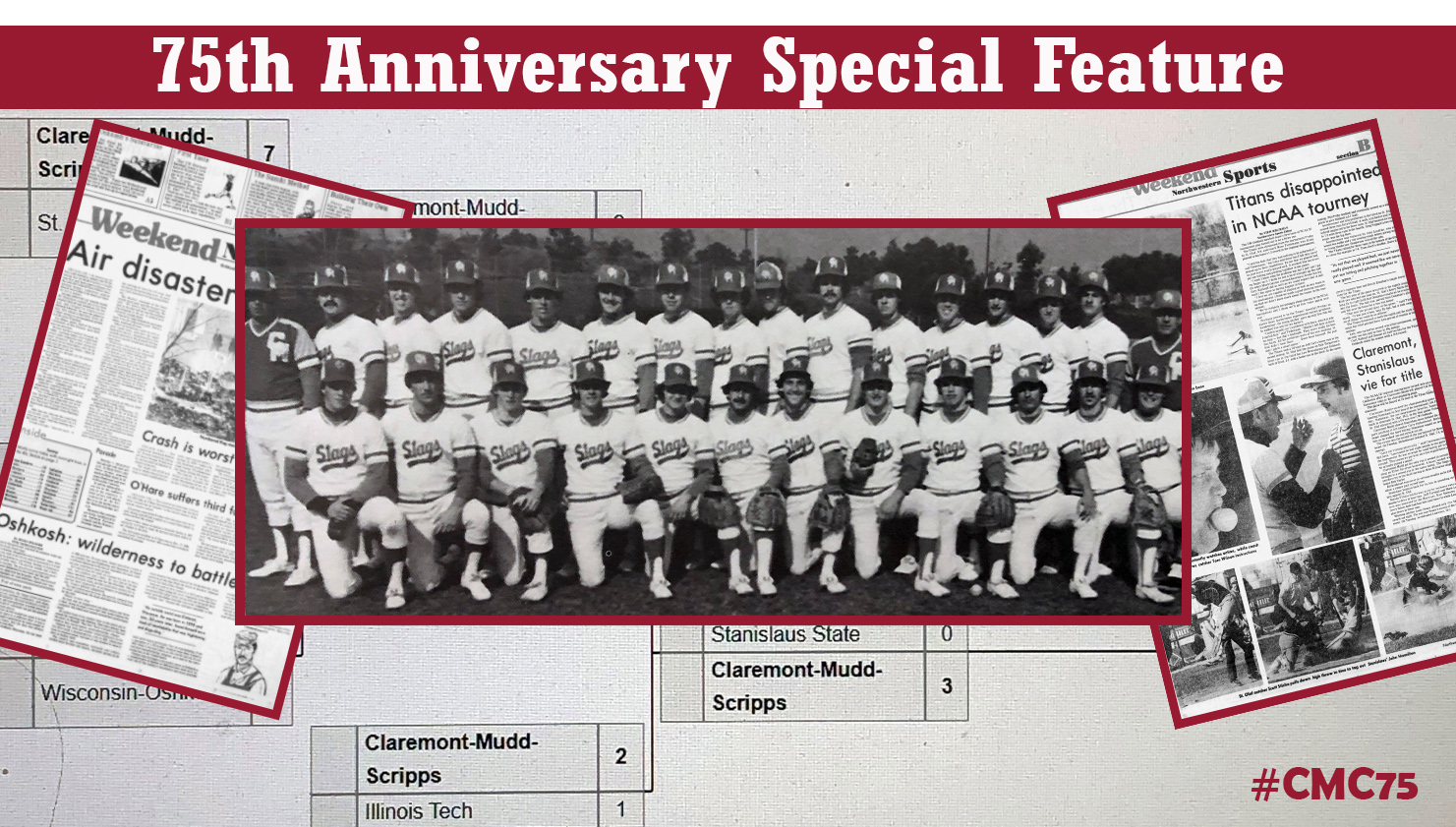
Still Alive: How the 1979 CMS Baseball Team Avoided Elimination, and Possibly Tragedy
Great Moments from 75 Years of Athletics
A walk through the three stories of Roberts Pavilion will reveal a myriad of trophies, plaques and team photos to commemorate the successes that Claremont-Mudd-Scripps has achieved during its 75 years of athletics history, including seven national titles and 343 conference championships.
However, there's nothing on display from the 1979 CMS baseball team, which might be responsible for the biggest wins of all, even if they didn't contribute to one of those championships.
The 1979 Stags aren't totally anonymous these days, 42 years after they reached the NCAA Division III Regional finals in Oshkosh, Wisconsin, but they're pretty close. There is a Hall of Fame plaque on the wall for All-America catcher John Pignotti, who hit .356 and struck out only twice (with 30 walks) his entire senior season in 1979, before playing professionally for three years in the minor leagues with the Oakland A's organization. There's also a section in the primary trophy case which celebrates the career of the team's head coach, Bill Arce, the founding Claremont-Mudd athletic director who was in his 21st (and final) season coaching the team. That exhibit showcases Arce's entire career and the many baseball awards he won, though, and doesn't contain anything specific to the 1979 season.
That's really all you'll learn about the 1979 CMS baseball team as you travel through the athletic department, though, its successes perhaps drowned in a sea of championships won by other teams over the years.
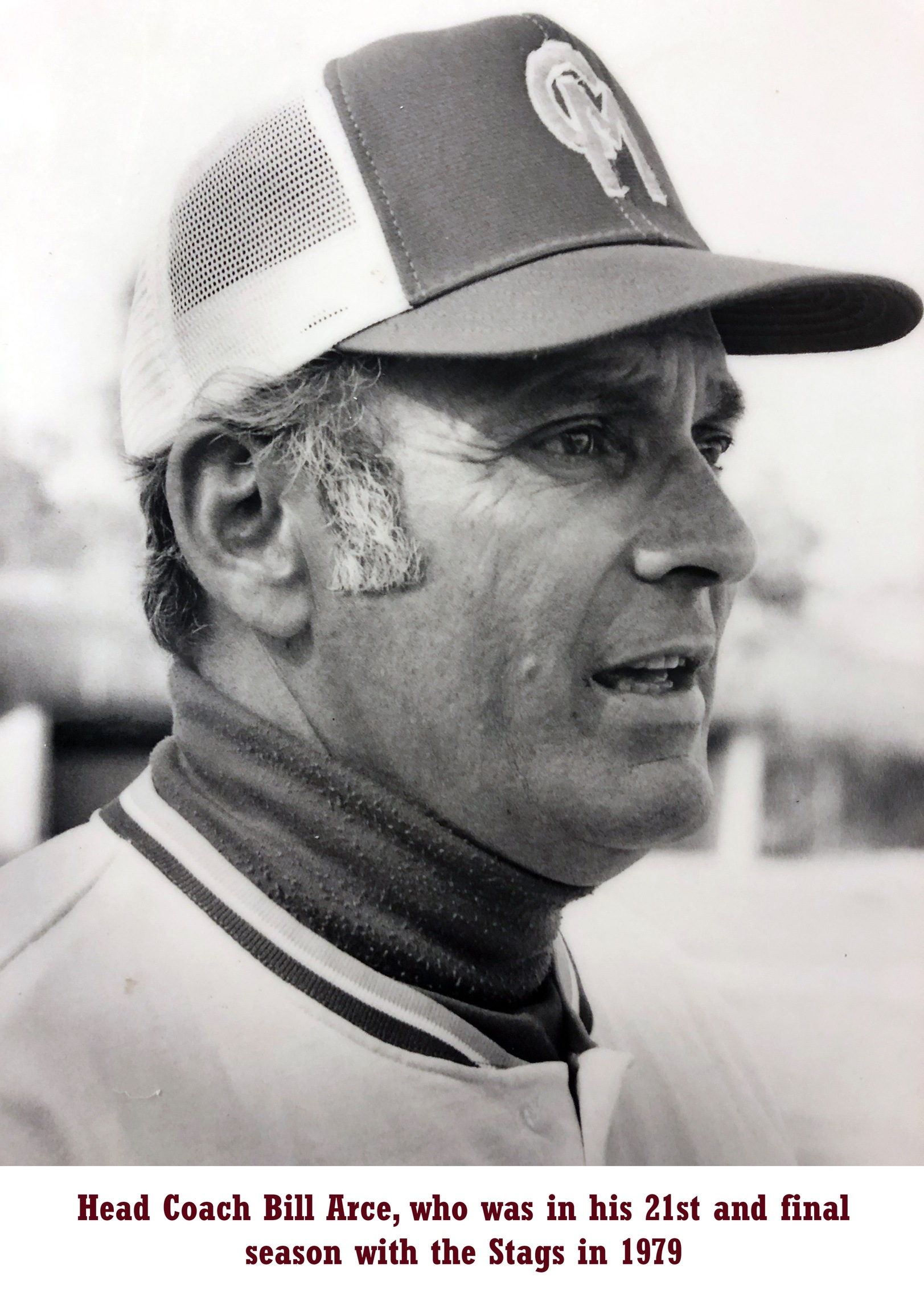 The Stags were certainly good enough to win a title, but they had some tough obstacles in their era. CMS finished a close second in the SCIAC, behind a powerhouse La Verne team that was still competing in the NAIA and was regularly putting alumni in the Major Leagues (seven La Verne players from the 1970s made the bigs). The Stags also came in second at the NCAA Division III West Regionals, winning three games before ending as runner-up to another powerhouse team, Cal State Stanislaus, which won the first two NCAA Division III national championships in 1976 and 1977.
The Stags were certainly good enough to win a title, but they had some tough obstacles in their era. CMS finished a close second in the SCIAC, behind a powerhouse La Verne team that was still competing in the NAIA and was regularly putting alumni in the Major Leagues (seven La Verne players from the 1970s made the bigs). The Stags also came in second at the NCAA Division III West Regionals, winning three games before ending as runner-up to another powerhouse team, Cal State Stanislaus, which won the first two NCAA Division III national championships in 1976 and 1977.
Only four teams reached the NCAA Division III nationals in those days, so CMS can technically claim to be a national quarterfinalist by reaching the regional championship game. The three wins in 1979 are also the most that the program has had in the NCAA Tournament during one year, but without a regional or a sectional or a super regional championship, there's no trophy that came with them.
It's an all-time great CMS team, without anything tangible to remember them by; and in many ways, that's a blessing.
CMS had a whirlwind of a week at those regionals in Oshkosh, playing four games that all had dramatic finishes in the first four days. Those four games featured just about everything you might expect from a wild postseason baseball tournament, from walk-off home runs to steals of home to unlikely heroes to gutty performances and even to gruesome injuries.
The Stags won three of the four, earning the right to play a fifth game in the double-elimination tournament, on a fifth day. CMS did not end up winning that last game, the NCAA West Regional Championship, on Saturday, May 26, 1979. In fact, it was the only forgettable part of the whole week, a blowout loss to the Stanislaus juggernaut ("a DI team masquerading as a DIII team," recalls CMS outfielder Jim Dunstan) when injuries and tired arms caught up with the Stags.
CMS had actually beaten Stanislaus once already in the regionals to get through to the championship game while facing elimination, a memorable 3-0 shutout win behind junior pitcher Gary Birkenbeuel. The night before, the Stags came through with their first dramatic elimination-game win of the tournament, edging Illinois Tech 2-1 by stealing home twice and surviving a failed squeeze play attempt in the ninth inning with the tying run on third.
Suddenly, after the Stanislaus upset, the Stags were one of only eight teams left standing in the country, and were one more win from going to the NCAA Division III nationals with a legitimate chance at a national title. Amidst the celebrations after those Illinois Tech and Stanislaus wins, you can be sure someone uttered a common three-word phrase to express relief after a close elimination-game victory:
"We're still alive."
Those same three words, though, would soon take on a whole different meaning. At some point after those wins, and before that loss in the regional finals, the team's attention was drawn from baseball strategy and scouting reports to what was happening on the news.
On the afternoon of Friday, May 25, 1979, American Airlines Flight 191 crashed less than one minute after taking off out of O'Hare Airport in Chicago on its way to Los Angeles, killing all 271 people (258 passengers and 13 crew members) on board, as well as two on the ground. It remains the biggest air disaster in U.S. history.
Without that dramatic NCAA Tournament run, which turned a five-day trip to Oshkosh into a six-day trip, the Stags would have been flying from O'Hare to LAX that day, potentially on that flight.
Exactly how much potential is something that has been debated over the years. The first word being spread around the hotel that night was that they were supposed to be on the plane that had just crashed, and that they needed to call home immediately to let everyone know they were safe, resulting in an anxious 20-player line at the lobby phone, not to mention some overwhelming feelings of relief. "I think a few of the guys got on their hands and knees and kissed the ground," recalls senior captain Mitch Wolf.
Some conflicting information then circulated later that they were actually scheduled on a different flight, but there were no printed travel itineraries to verify what was correct, and there isn't a uniform consensus among the Stags about what a parallel timeline might have looked like where they weren't still playing baseball that day.
There could never really be a cut-and-dry answer, though, since teams often try to change their departure times after being eliminated from an NCAA Tournament, and it is impossible to know if CMS would have kept its original reservations, whatever they may have been (in fact, the CMS coaching staff changed flights after the tournament was over, but to a different airport entirely to avoid the scene at O'Hare). All the Stags can know for sure is that if they had suffered their second loss sooner, they would have been flying home that day, and there is a non-zero percent chance they would have been on Flight 191. Whether those odds were closer to five percent or 95 percent, the brush with tragedy was still much too close, and has had a profound impact on many of their lives.
When the Stags first took their one-way flights eastward from LAX to O'Hare on Sunday, May 20, or Monday, May 21 (the seniors came on a separate flight the following day so they could attend Sunday's graduation ceremonies), they weren't thinking at all about the return trip. They just knew they wanted to delay it as long as possible by winning games, starting with their NCAA Regional opener against St. Olaf on Tuesday, May 22.
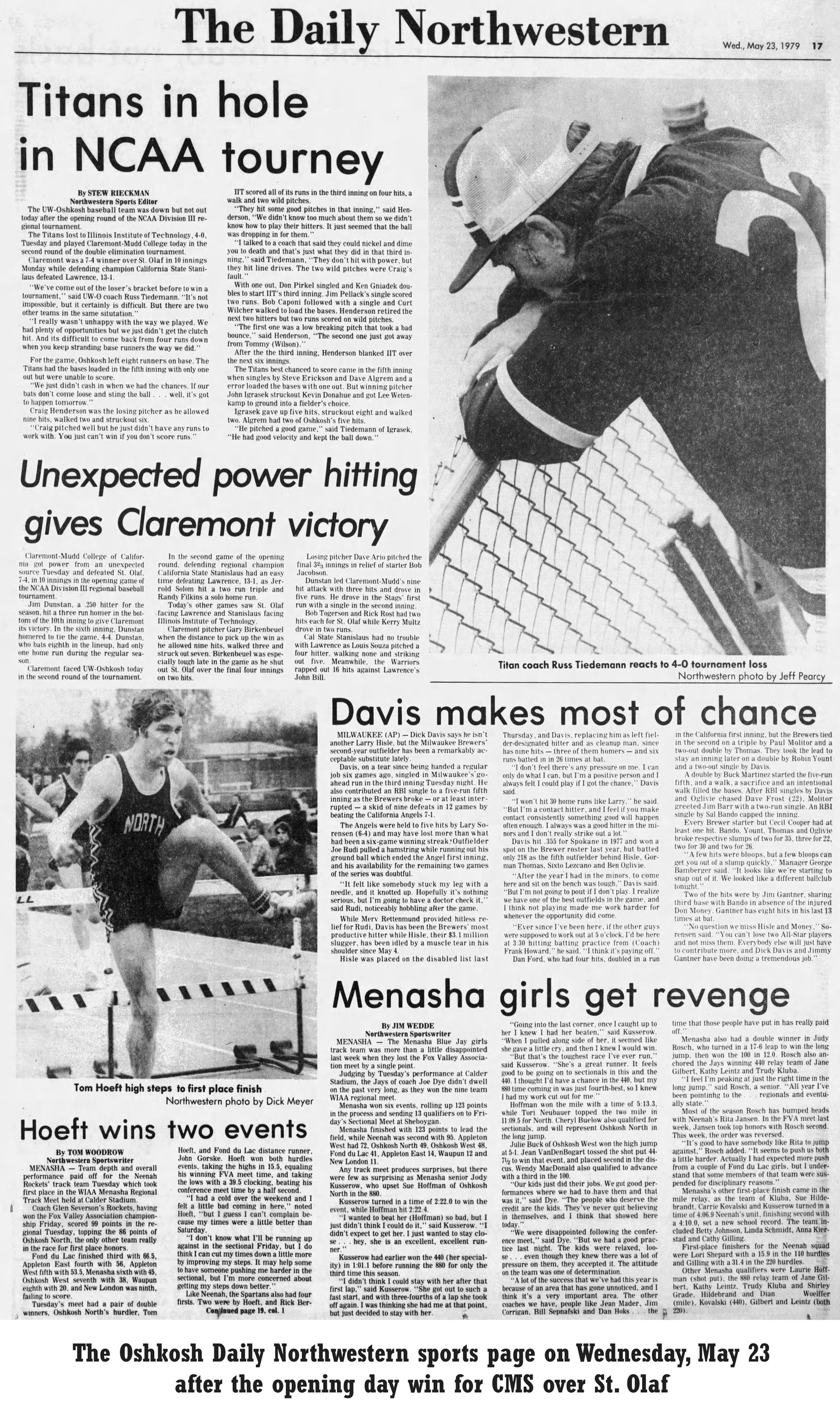 Tuesday, May 22
Tuesday, May 22
CMS 7, St. Olaf 4 (10 Innings)
In the first game of the six-team NCAA West Regionals on Tuesday morning, St. Olaf scored three runs to take a 4-3 lead over CMS in the top of the sixth inning, as it hoped to knock the Stags into the loser's bracket and potentially make it a short stay in Oshkosh. It was unseasonably cold at the 10 a.m. first pitch, which was a bit of an advantage for the Midwest teams that had been playing in weather like that all year.
"The temperature at game time was something like 40 degrees because a cold front had moved in," said Dunstan. "So us California guys were layered up with two sets of sleeves each under our uniforms. The St. Olaf guys, from Minnesota, decided to show us what-for, and took pregame drills shirtless. We ended up standing at the rail in the dugout and giving them a huge cheer. But that suddenly gave us an identity, the California boys coming east to take on half of the rest of the country. I think somebody even starting singing 'I wish they all could be California Girls,' and we had a huge laugh at ourselves. It loosened us up, but also brought us together in a way I'm not sure any of Arce's great pep talks could have."
Birkenbeuel, who was making the first of his two regional starts, has similar memories of the weather. "It was so bitterly cold," he said. "I remember between innings, I would go put on 2-3 jackets in the dugout and keep a hot water bottle on my arm to try to somehow stay warm."
The Stags came right back, though, as Dunstan got enough power from beneath his two sets of sleeves to tie the score with a home run to make it 4-4 in the bottom of the sixth. It was just his second home run of the year, and it turned out to be his second-biggest home run of the day.
As the weather warmed up (a little), so did Birkenbeuel, as he put a string of zeroes up on the visitor half of the scoreboard, allowing only two hits over his final four innings of work. The Stags couldn't push across a tiebreaking run in the late innings, though, and the score remained tied 4-4 through nine. Arce left Birkenbeuel in to pitch the tenth, and he once again shut St. Olaf down to keep it a 4-4 game.
"It was a different era, and pitchers typically threw as long as they could," said Birkenbeuel, "especially in the postseason, when you knew you would need your other pitchers for the upcoming games. I don't remember if I would have pitched the 11th, but I imagine so. I felt like I was pitching better as the game went on, and I probably would have kept going as long as possible."
Fortunately, he didn't have to find out. With two outs in the bottom of the tenth, and two Stags on base, Dunstan came up again. St. Olaf had retired him for the only time on the day in his previous at-bat, barely, and the game within the game began to play out as he came up with a chance to win it with a base hit.
"What I remember most of that sequence was the beginning of the at-bat," Dunstan said. "Two innings previous, against the same lefty pitcher, I ripped a ball deep to left (opposite field for me), the left fielder making an over-the-shoulder catch at the warning track on the dead run. As I entered the box, the pitcher stepped back off the rubber, and turned to motion his left fielder to back up. Now, I was a dead pull hitter, that previous shot was one of the few times I'd gone to left all year. I stepped back out of the box and started laughing. Coach Arce was coaching third and yelled out at me, trying to stifle his own laugh, 'Get back in the box and hit the ball, son!'"
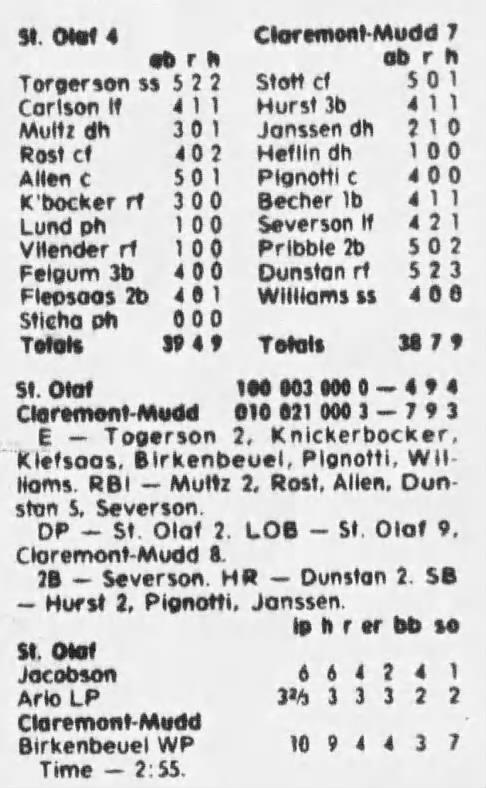 Dunstan had been hitting the ball well the entire game (he also had a line drive RBI single in the second, and his second at-bat was a bunt), but he wasn't sure he'd get the chance to swing the bat in either of those last two big spots. With two on and two out in the tenth, a single to the outfield would almost certainly win it, and St. Olaf had a favorable lefty vs. lefty match-up with Dunstan up in the eighth spot in the batting order. The percentages might make sense for Arce to go for a right-handed hitter off the bench and try for the win right there, and try to avoid an 11th inning for Birkenbeuel (St. Olaf had gone to the bullpen in the seventh and had a fresher arm in the game). Arce ignored the book, though, and left his hot bat in there.
Dunstan had been hitting the ball well the entire game (he also had a line drive RBI single in the second, and his second at-bat was a bunt), but he wasn't sure he'd get the chance to swing the bat in either of those last two big spots. With two on and two out in the tenth, a single to the outfield would almost certainly win it, and St. Olaf had a favorable lefty vs. lefty match-up with Dunstan up in the eighth spot in the batting order. The percentages might make sense for Arce to go for a right-handed hitter off the bench and try for the win right there, and try to avoid an 11th inning for Birkenbeuel (St. Olaf had gone to the bullpen in the seventh and had a fresher arm in the game). Arce ignored the book, though, and left his hot bat in there.
"What flashed into my mind at that moment was gratitude to Bill, for believing in me," Dunstan said. "I was a horribly streaky hitter all year. I'd get seven hits in a doubleheader one weekend, then go hitless for the next four games. I'd been on a real down streak going into the tournament, and wasn't sure I'd even play. When they brought in a lefty during the game, I figured Bill would pull me, since at that point, I wasn't getting much time against lefties. All that flashed through my head as I stepped back in, and I thought to myself, 'well, if Arce thinks I can do it, I certainly can.'"
The result of that confidence was a walk-off homer, a 7-4 win, and one of the most memorable highlights of the entire week. "That was an incredible home run that Jim hit," said Birkenbeuel. "What a moment that was."
Dunstan might not have had many regular season home runs, but he did have a few near-misses, and he thought off the bat that his winner might be another one.
"I remember the ball looking the size of a watermelon that day," Dunstan said. "I'd only hit one other home run all year, although I did have a pretty good slugging percentage with lots of doubles off the wall. I remember as the ball left the bat, thinking that I didn't hit that as far as the first one, and it might end up off the wall, so I was in a full sprint. Apparently, I never slowed down when it cleared the fence, and practically ran over the guy in front of me on the bases."
Fortunately, that didn't happen, since being called out for passing a baserunner would have been a bad way to spoil a walk-off homer.
"I remember John Pignotti, our All-America catcher, chiding me afterwards that if I was going to keep hitting like that, I'd need to work on my home run trot," said Dunstan. "The reception at home plate was everything a kid ever could dream of, getting totally mobbed."
With the win in the books, and standing at 1-0 in the double-elimination tournament, CMS knew it had at least two more games to play and didn't have to think about a return flight just yet. A rainy Wednesday postponed the tournament schedule and gave the Stags another 24 hours to savor the walk-off win and prepare for the task ahead.
It also gave an extra day for Birkenbeuel to rest his arm, which turned out to be an important benefit.
Thursday, May 24
Wisconsin-Oshkosh 3, CMS 2
CMS 2, Illinois Tech 1
With the rain gone and the field ready to go, CMS faced the hosts from Wisconsin-Oshkosh in its second game of the regionals on Thursday, May 24, and once again had a dramatic finish. This time the Stags couldn't pull off the same late-inning magic, despite a strong pitching performance from Wolf, who was seeing his first action in about 18 days after two weeks off for finals and graduation. He shook off any rust right from the opening pitch, taking a no-hitter into the seventh inning in his final career start, before settling for a no-decision when he came out with the score tied 1-1.
Wisconsin-Oshkosh broke the tie with two runs in the eighth, and the Stags bounced back to pull within 3-2 in the ninth and had the bases loaded, hoping for their second straight win in their last at-bat. The hosts held on, though, ending the game on a groundout, and CMS felt the other side of the dramatic postseason game experience, switching out the wild celebration for lamenting the missed opportunities of a close defeat, leaving 12 runners on base in a one-run loss.
"We should have won the game, but we could not score," said Wolf, who, as it turned out, had the first of two no-hit bids for the CMS pitching staff on the day. "Being able to rest our pitchers during the break was probably a good thing. Based on our performance in the playoffs, it paid off."
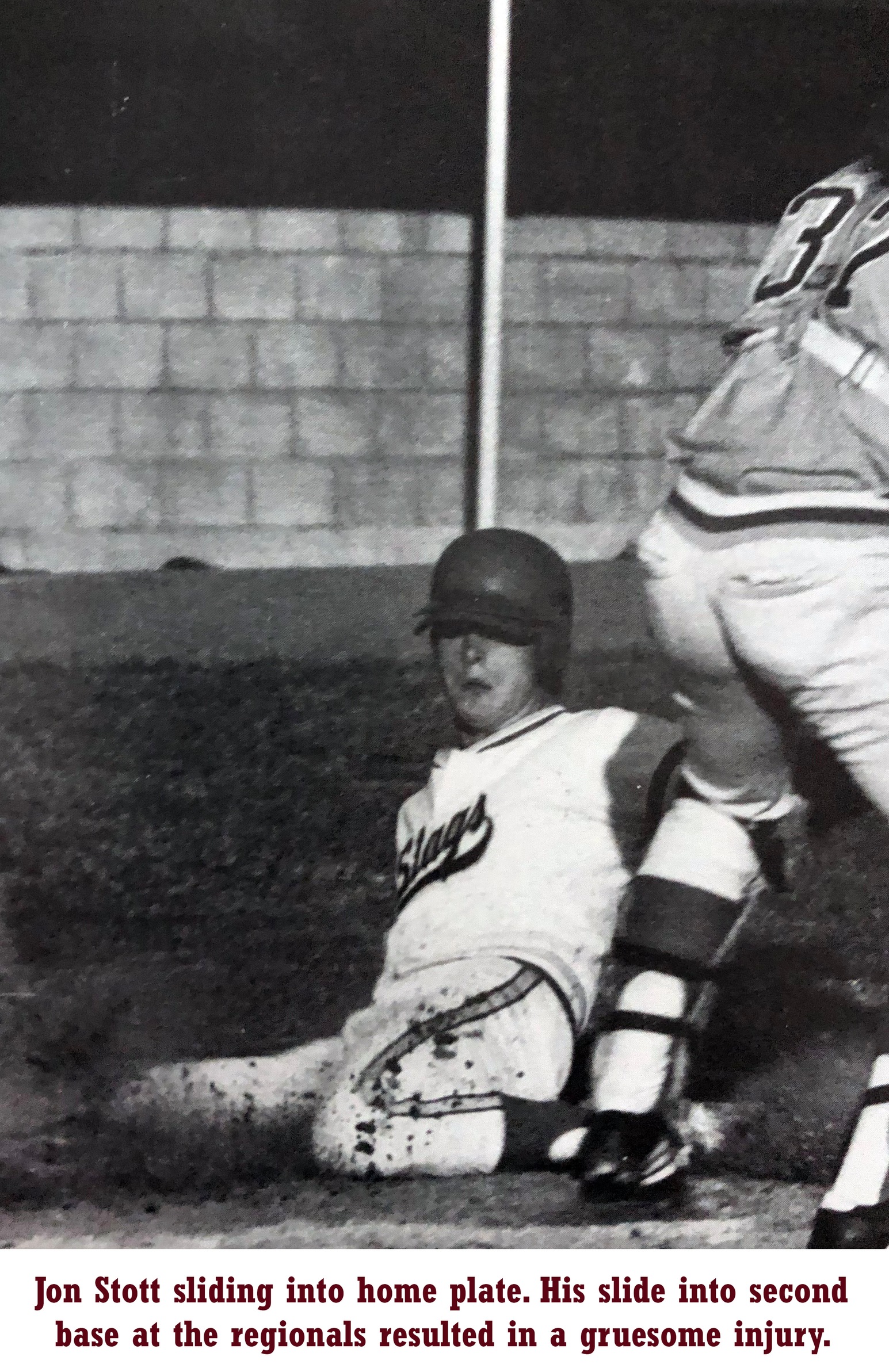 Adding yet another layer to the week's drama was a bloody injury suffered by Jon Stott, the Stags' center fielder and leadoff hitter, when he was trying to break up a double play in the ninth inning.
Adding yet another layer to the week's drama was a bloody injury suffered by Jon Stott, the Stags' center fielder and leadoff hitter, when he was trying to break up a double play in the ninth inning.
"The entire Stags team took a quick dislike to their cocky second baseman," recalled Stott, "and when a double play ball was hit while I was on first, I considered it my duty to not only break up the DP, but to put the second baseman into orbit. I never actually touched him, but I did break up the DP. I went in very hard at full speed, but because I was playing fair (not a cleats-up slide), I ran into the base with both of my knees bent, ready to swipe him off his feet as I reached the bag.
"Unfortunately, I was reminded at that moment that NCAA bases are very secure in the ground, and had steel rims around the sides. I slammed into that rim with my lower leg and stopped on a dime. The second baseman was so surprised that he just looked down at me with his mouth open and never made a play to first. The injury was ugly. Doctors told me it was a pressure laceration and told me to imagine throwing an orange against the wall and seeing the sides split. I spent the rest of the tournament on pain meds which explains why I have a hazy memory of the rest of the trip."
The wound was bad enough to shake up his teammates who managed to get close enough to have a look. "He split his knee open," said Wolf. "It was an ugly injury."
"There was probably a four or five inch gash torn in his leg," said Birkenbeuel. "There was blood everywhere. It was pretty sickening. I felt awful for Jon, but the rest of us had to try to block that out, pull together and keep playing."
The Stags didn't have too much time to think about Stott's injury, or their missed chances, since they had to come back and play again a few hours later, this time in an elimination game against Illinois Tech. The Scarlet Hawks were reeling a bit themselves, after just suffering a 20-2 defeat to Stanislaus for their first regional loss.
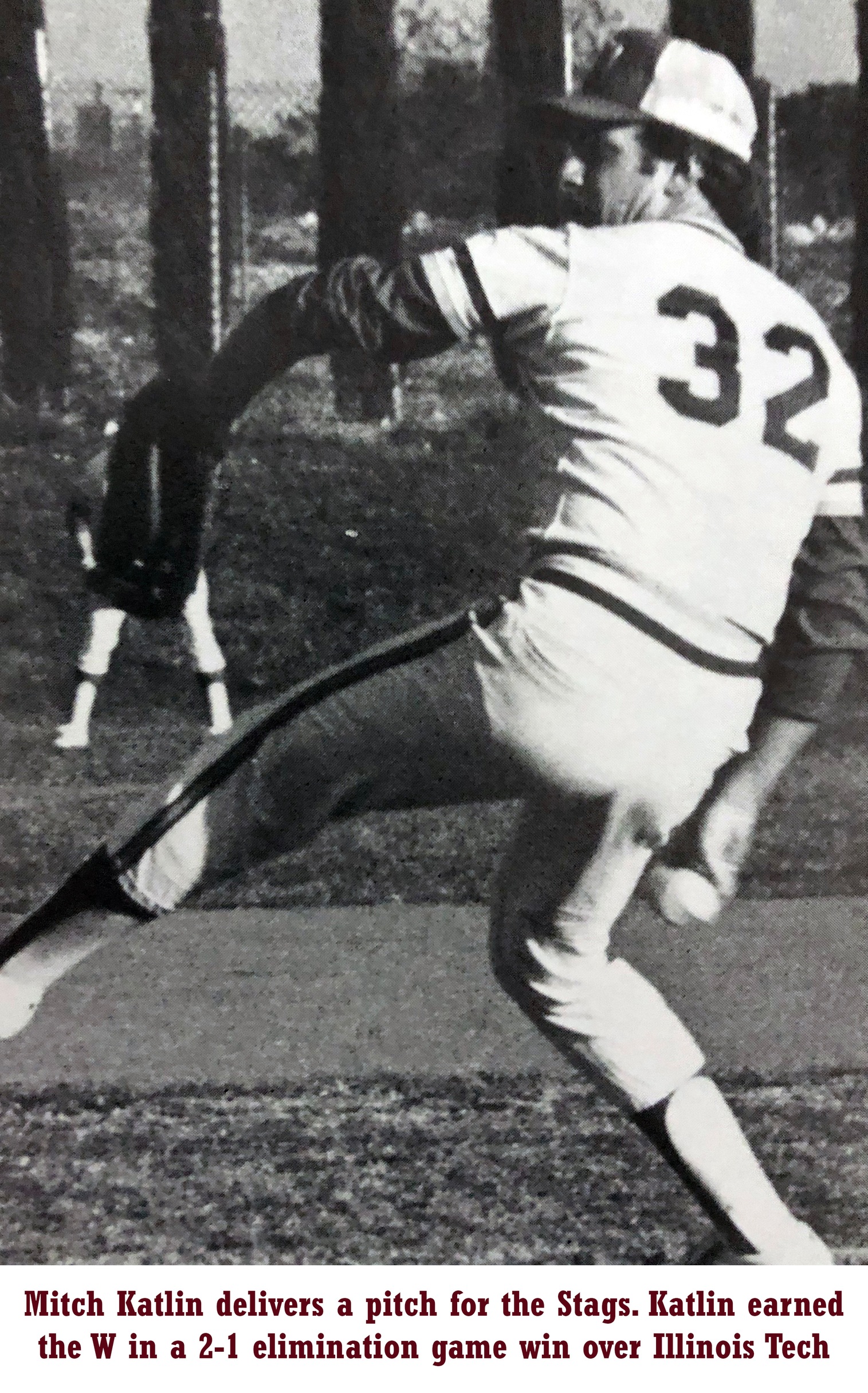 With runs at a premium, senior Mitch Katlin threw yet another gem for CMS, almost matching Wolf by carrying a no-hitter into the sixth inning in his final career start. Katlin actually threw the final 1.1 innings in relief against Wisconsin-Oskhosh earlier in the day without allowing a hit, retiring all four batters he faced, and then threw five no-hit innings to start the Illinois Tech game, so both senior Mitches could claim six straight no-hit innings to begin their final NCAA Tournament.
With runs at a premium, senior Mitch Katlin threw yet another gem for CMS, almost matching Wolf by carrying a no-hitter into the sixth inning in his final career start. Katlin actually threw the final 1.1 innings in relief against Wisconsin-Oskhosh earlier in the day without allowing a hit, retiring all four batters he faced, and then threw five no-hit innings to start the Illinois Tech game, so both senior Mitches could claim six straight no-hit innings to begin their final NCAA Tournament.
"This is where our team depth came into play," said Birkenbeuel. "You have to have deep pitching, and Wolf and Katlin were both really great pitchers. They were both seniors and this was their swan song, and they came through. They were both four-year varsity players and it was a great way for them to end on a couple of great outings."
Offensively, the Stags found a different path to success than their first regional win, when Dunstan's power produced the key runs. This time, the game pretty much just came down to baserunning.
CMS got on the board in the first inning after a double from Mike Williams and a single from Tom Hurst put runners on first and third, and then a successful double steal brought Williams home. In the third inning, the Stags repeated history with a different cast of characters to take a 2-0 lead, as Chuck Pribble doubled, Pignotti singled, and Pribble came home on a similar double steal, allowing CMS the rare achievement of stealing home twice in the same game.
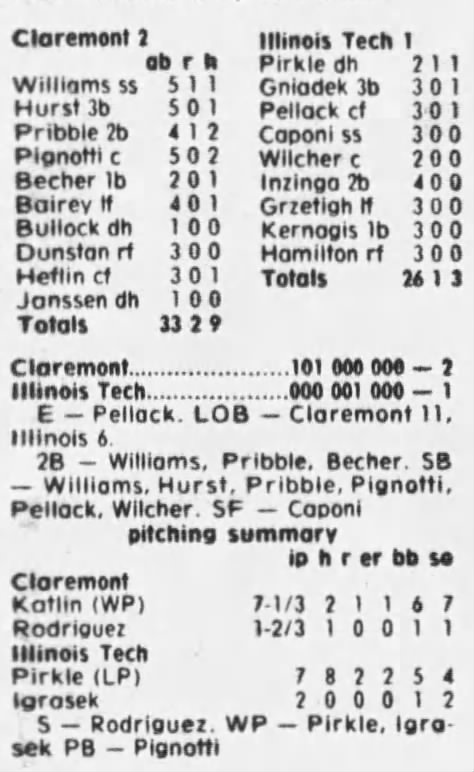 Illinois Tech got its first hit off Katlin in the sixth, and scored later in the inning on a sacrifice fly to make it 2-1. The Scarlet Hawks put pressure on in the late innings, loading the bases in the eighth and putting the tying run on third with one out in the ninth. The Stags worked their way out of both jams, though, throwing out the runner in the ninth after a failed attempt at a tying squeeze play, and they walked off the field late at night with their second dramatic win, avoiding elimination and delaying their return trip a little longer.
Illinois Tech got its first hit off Katlin in the sixth, and scored later in the inning on a sacrifice fly to make it 2-1. The Scarlet Hawks put pressure on in the late innings, loading the bases in the eighth and putting the tying run on third with one out in the ninth. The Stags worked their way out of both jams, though, throwing out the runner in the ninth after a failed attempt at a tying squeeze play, and they walked off the field late at night with their second dramatic win, avoiding elimination and delaying their return trip a little longer.
The bullpen was also big in keeping the Stags in the tournament, as Art Rodriguez finished out the game, getting the final five outs and allowing just one hit, with the CMS staff holding Illinois Tech to only three hits over nine innings. "Artie was such a great closer," said Birkenbeuel. "I don't know how many games he finished that season, but he saved our bacon a bunch of times."
The news wasn't all good from the Illinois Tech game, as the Stags unfortunately lost a second starter in one day, when Dunstan dove for a ball in the outfield, aggravating a shoulder injury that he had been doing his best to conceal during the year and sidelining him for the rest of the tournament (other than a pinch-hitting appearance in the finale). His injury cost the Stags two-thirds of their starting outfield, as well as a hot bat in the lineup at the worst possible time.
Arce and his staff would have to make some adjustments after the Thursday attrition, but the important thing was that there was still another game to play, although it would come quickly. There was pretty much just enough time for the Stags to get some food, perhaps make celebratory phone calls home, get a short night of sleep, and then return to the ballpark in the morning for their toughest test yet.
Friday, May 25
CMS 3, Cal State Stanislaus 0
The Illinois Tech win set up a game with Stanislaus on Friday, May 25, which CMS had to win, but Stanislaus didn't. The Warriors had crushed Lawrence 13-1 and Illinois Tech 20-2 in their first two games, and were looking to advance to the regional finals with three straight wins. For the Stags, a win would put them through to a winner-take-all game on Saturday for the regional championship, while a loss would send them home.
As much as CMS hoped the momentum from the previous night's 2-1 victory might carry over, a win perhaps felt like a tall order, playing down two starting outfielders against the hottest team in the tournament. Knowing the Stags had no margin for error, Arce came back with Birkenbeuel on short rest, even after he threw all 10 innings in the opener against St. Olaf. It was perhaps a risky decision, but Birkenbeuel defined "crafty lefty" at 5-9, 155 pounds, and didn't necessarily need a live arm or power pitches to be effective.
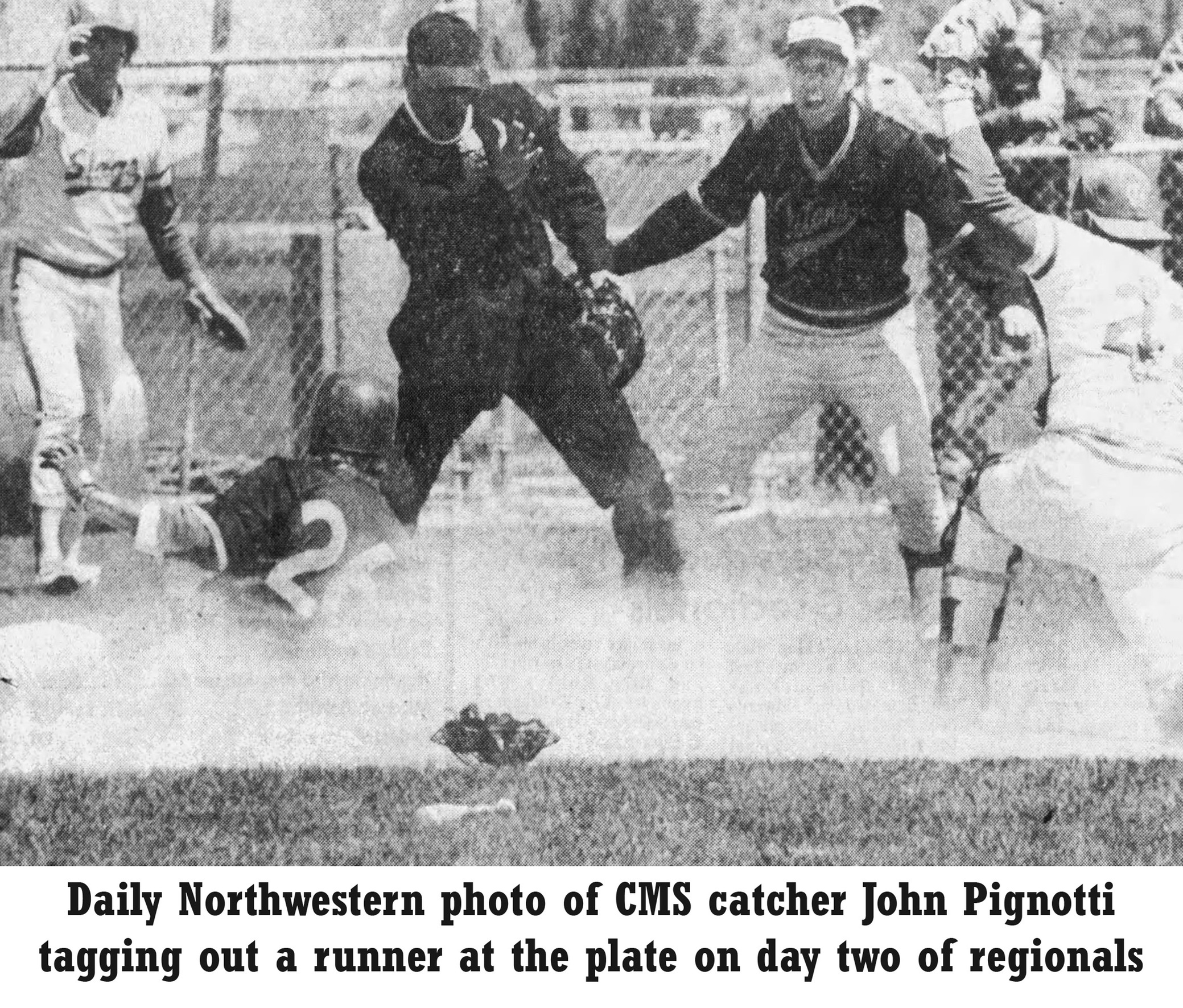 "I wasn't a fast ball pitcher, but I had a lot of junk and could throw four different pitches," said Birkenbeuel. "I remember I had good stuff that day, and a big key was that I was throwing strikes, along with some fantastic D. I was a ground ball pitcher, and since I was getting ahead in the count, I was forcing them to swing at pitches that they probably didn't want to swing at, and the guys made all the plays behind me. I knew I wasn't going to throw anything by them. They were just a powerhouse, they were putting up 18, 19, 20 runs a game and just pounding the ball."
"I wasn't a fast ball pitcher, but I had a lot of junk and could throw four different pitches," said Birkenbeuel. "I remember I had good stuff that day, and a big key was that I was throwing strikes, along with some fantastic D. I was a ground ball pitcher, and since I was getting ahead in the count, I was forcing them to swing at pitches that they probably didn't want to swing at, and the guys made all the plays behind me. I knew I wasn't going to throw anything by them. They were just a powerhouse, they were putting up 18, 19, 20 runs a game and just pounding the ball."
The Stags also gave Birkenbeuel some early run support, taking a 3-0 lead by the top of the third, with the first run coming to start the second inning on an unlikely home run hit by senior Elliott Severson. It was pretty remarkable that Severson was even in the batter's box to have such a big swing, for several reasons. Similar to Dunstan's winning homer in the opener, it was a lefty-on-lefty matchup. Knowing that Stanislaus was throwing a left-hander, Severson wasn't expecting to be in the lineup, and prior to that, he wasn't even sure that he would have a senior season at all.
"I was a left-handed pitcher and a DH as a freshman," he said. "I was hitting well, but they would never let me DH if I was pitching. This situation was very frustrating to a hard-headed 18-year-old. I eventually hurt my arm and ended up quitting the team. My sophomore year I spent the spring semester in Lugano, Switzerland, and my junior year I spent the spring semester on an internship in Washington, D.C. My senior year I came back and asked Arce if I could try out for the team."
Arce was in his 21st season as the head coach and he had dealt with plenty of hard-headed 18-year-olds along the way, as well as internships temporarily getting in the way of athletic careers. So he welcomed Severson back, with only one little caveat.
"Much to my surprise, Arce let me come out and I ended up being the starting left fielder, with one condition," he said. "Arce never let me face left-handed pitching. The starting pitcher for Stanislaus was a left-hander and for some reason, Arce decided to let me hit."
It could have been a gut feeling, or perhaps the Stags being down a couple outfielders with injuries meant that Arce wanted to keep Severson in the lineup for defensive purposes. Either way, what happened next wouldn't have been predicted by anyone.
"I remember it like it was yesterday," said Severson. "I had not seen a left-handed curve ball in almost four years. The first pitch was a curve ball, and I basically jumped out of the batter's box while waving my bat in the general direction of the ball. I could not look at Arce, but I was imagining what he was thinking of his decision.
"Needless to say, the next pitch was a curve ball as well. I sort of stayed in the batter's box this time and waved a little closer as the pitch went by. The count was 0-2 and I was pretty certain, given my first two attempts, that the next pitch would be another curve. It was, and I remember hitting it over the right-center field fence and being simply ecstatic as I ran around the bases."
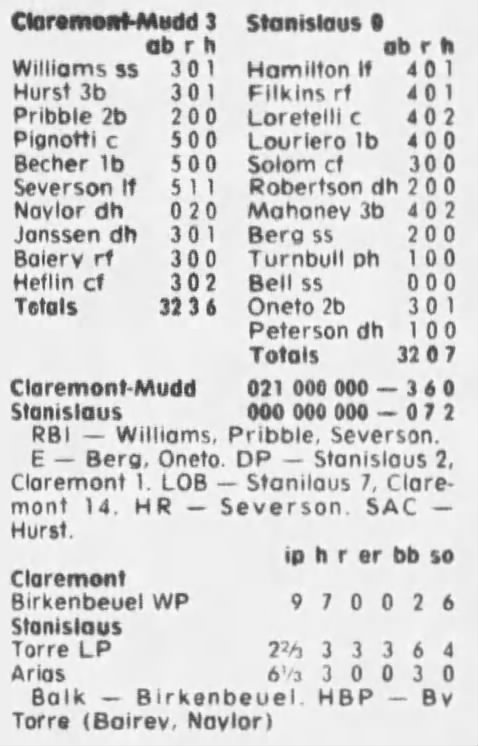 Nobody appreciated it more than Birkenbeuel, who knew he had a lead, which grew to 2-0 in the second after a bases-loaded walk drawn by Pribble, and 3-0 in the third, after an RBI single from Williams scored Steve Naylor. That meant that over his last seven innings, Birkenbeuel had a little cushion against a potent lineup, and had the confidence of knowing that one mistake pitch wouldn't end the season.
Nobody appreciated it more than Birkenbeuel, who knew he had a lead, which grew to 2-0 in the second after a bases-loaded walk drawn by Pribble, and 3-0 in the third, after an RBI single from Williams scored Steve Naylor. That meant that over his last seven innings, Birkenbeuel had a little cushion against a potent lineup, and had the confidence of knowing that one mistake pitch wouldn't end the season.
"What an incredibly timely home run that was by Elliott," he said. "I'm not sure if we would have scored much against them otherwise, but we were able to shock them a little and put a '3' on the board early, and then the pressure was on them."
Birkenbeuel continued to keep the powerhouse Stanislaus lineup off balance, even as his innings kept adding up. He ended up throwing 19 innings in a span of three days to pick up two wins, the second a seven-hit shutout against arguably the most potent offense in the nation. His performance also showcased the benefits of scattering hits. Not only did he get the shutout, but he never even allowed a Stanislaus runner to get past second base, despite allowing seven singles.
"The biggest thing in the tournament for me was Gary shutting down Stanislaus," said Dunstan. "They destroyed everybody in their path in that tournament, except when Gary beat them. I was on the bench that game, my shoulder not letting me play, and was in awe of his performance, slicing and dicing pitches on the corners, frustrating the crap out of the Stanislaus guys. I remember in later years watching Greg Maddux of the Braves in his prime, and always thinking to myself, 'that's what Birkenbeuel looked like that day.'"
"Gary did an amazing job shutting down Stanislaus," said Severson. "Every inning I remember thinking 'keep going Gary, you're doing great!' Towards the end of the game, I remember thinking 'we're going to win this game.' Then when the game was over I remember thinking, 'I can't believe we beat those guys.'"
Everybody was riding high after the win and during their celebratory meal after the game. The Stags knew they couldn't celebrate too much, since the Birkenbeuel-fueled slump didn't last very long and Stanislaus bounced back to throttle St. Olaf 19-2 in its own elimination game. That meant that they would have to face to beat the revenge-minded Warriors again in order to advance to the NCAA Division III nationals, and they would have to do it by getting their minds back on baseball, which was going to be a very difficult task, after the coaching staff called everyone into the hotel lobby for an emergency meeting.
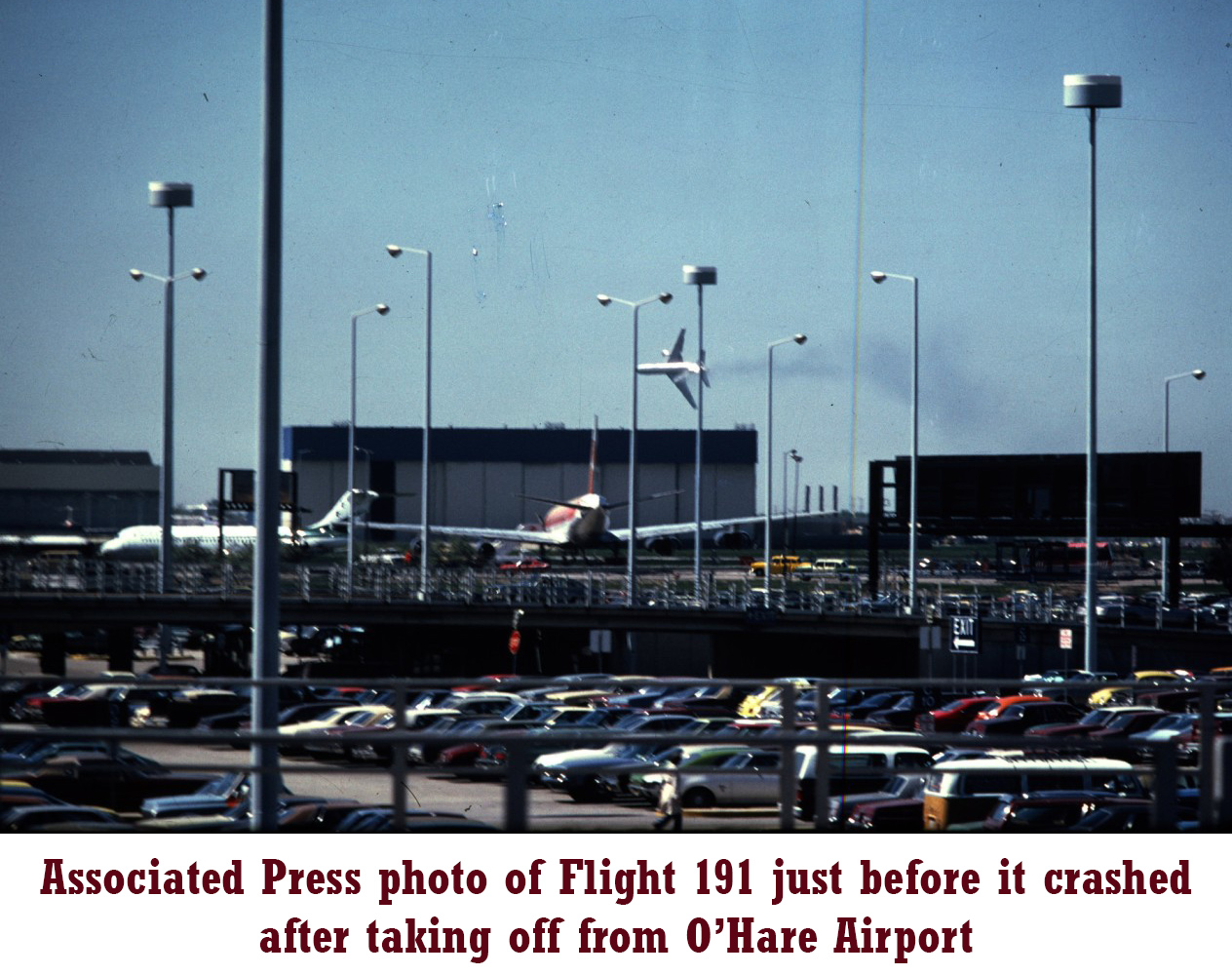 Friday, May 25, 3:03 p.m.
Friday, May 25, 3:03 p.m.
American Airlines Flight 191 Crashes at O'Hare
While the Stags were still reliving the Stanislaus win, and thinking about how to match up with them a second time, the real world interrupted. Two hours away at O'Hare Airport, American Airlines Flight 191 lost an engine on takeoff, gained a little bit of altitude, and then tilted on its side and crashed to the ground just 31 seconds after becoming airborne. It was a horrifying scene to anyone who was near O'Hare and witnessed the large DC-10 in obvious distress, perpendicular to the ground and plummeting, or the loud boom and huge fireball that ensued in the vacant airport lot beyond the parking garages.
The news was also horrifying to people who knew someone flying from Chicago to Los Angeles that day. The CMS baseball traveling party included approximately 30 such people, according to the team's original travel plans.
Many family members and close friends of the Stags likely knew that they had a game to play on Friday from the celebratory phone calls the players delivered the night before, but with the lack of instant information available, about either baseball scores or flight plans, there was no way to know for certain what had happened in the hours since. Did the Stags lose that game to Stanislaus on Friday morning and still make the originally scheduled flight? Is it possible somebody could have left early and come home on Friday anyway? It was a challenge for their parents to get quick and definitive answers, and for many, the predictable panic set in.
There were even a few cases, before the coaches could round everyone up, when the parents were the ones delivering the news. "A couple of us actually found out about the crash when our parents called us in tears at the motel, praying we'd still be there," said Birkenbeuel. "They had our original itinerary, and they said we were supposed to be on that flight."
It didn't take long for some frantic activity to begin to stir around the hallways. "I heard running and knocking on doors and the coaches yelling for everyone to get into the lounge," said Dunstan. When the team gathered, a few had spoken to their parents, or saw the news and were aware of a plane crash at O'Hare, but then they were told information that made it really hit home.
"I remember we were all amped up because we had just beaten Stanislaus," said Wolf. "Then we were told there was a plane crash out of O'Hare to LAX and that we were supposed to be on it, but because we had won and extended our stay, we were not on the flight. Everyone went silent and it was very eerie. Our celebration stopped immediately. We were talking to ourselves and didn't know what to say to each other. I remember calling home and my parents had no idea there was a plane crash."
For some of the younger players on the team, it was especially difficult to process what was going on.
"We were young and some of us had just experienced our first plane flight," said DJ Janssen, a freshman on the 1979 team. "Winning a 3-0 game was just another ballgame, until we found out the ramifications afterwards and had to tell our parents we were alive."
The task of connecting to tell someone important information was difficult in an era in which land lines were the only option and most people didn't even have answering machines. The Stags had to line up and use the lobby phone, which meant the conversations had to be short, so the next people in line could have a turn. A few fortunate parents, such as the Wolfs, hadn't heard about the plane crash yet when their sons called and were spared those fearful moments of uncertainty.
"I was getting more and more worried while waiting in line to call my folks," said Stott. "When I finally reached them, their response was, 'What crash?'"
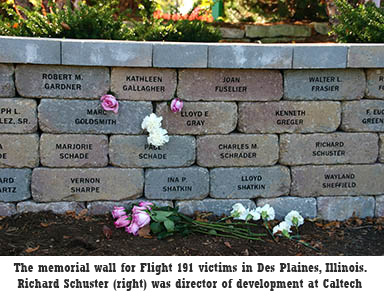 Others weren't so lucky and were scrambling for confirmation, and every minute of not knowing felt like hours. A few of the players from outside of the Southern California area also had their parents waiting for them in Claremont to help them pack and make the drive home. That meant their parents weren't at home to take a phone call either, making that reassuring connection even more difficult. The panic was starting to spread rapidly for many of them, before the good news could finally be spread in its place.
Others weren't so lucky and were scrambling for confirmation, and every minute of not knowing felt like hours. A few of the players from outside of the Southern California area also had their parents waiting for them in Claremont to help them pack and make the drive home. That meant their parents weren't at home to take a phone call either, making that reassuring connection even more difficult. The panic was starting to spread rapidly for many of them, before the good news could finally be spread in its place.
"I called my Mom who was in Claremont for graduation," said Severson, an Arizona native. "She was so relieved to hear my voice and she told me that everyone was worried sick as they thought some of us were on the flight as scheduled. I believe the team was a little shocked and subdued. I remember thinking that the whole situation was divine intervention."
Dunstan needed third-party assistance to eventually get the good news where it needed to go, after several tries. "My parents were on vacation in New York, so I called my older sister, who couldn't get hold of them either," he said.
Even after all the phone calls had been made and the worst case scenarios were no longer bouncing through the minds of their loved ones, that evening it was hard for the Stags to get their minds on baseball. Wolf's recollections include hearing a couple hours after that first lobby meeting that the team was actually scheduled on a different flight after all, which provided him a little bit of temporary reassurance that their brush with tragedy wasn't quite as close as he first feared. "For an hour or two we thought we were blessed, and I'm not a religious person," he said.
At that point, it didn't really matter, though. The scenes on television still resonated with him deeply and have stayed with him over the last four decades.
"The plane crash was all over the news and you could not help but watch," Wolf said. "They were placing markers, little flags, where they found bodies and remains of the passengers. I kept thinking that could have been us and this is what our families and friends would be seeing. It was awful. At the time it definitely made you think about life. It left a mark on me and is something I will never forget."
Some of the Stags have tried to piece together the alternate timeline from that day, looking for clues if they really were one untimely bad pitch, or swing and miss, away from being on Flight 191. Out of curiosity, Dunstan has done some research into FAA reports and other documentation, and he believes that the Stags were supposed to be on board. He says that the number of empty seats on the flight, eerily close to the size of a college baseball team, gave him more than a little pause.
"For me, there have been some survivor guilt moments," said Dunstan. "If I hadn't had the walk-off against St. Olaf, we might have been out of the tournament and traveling that day. I know that there's still some controversy as to whether we would have been on that plane, but my research indicates that we would have. Does it make you feel like you've been sent with a higher purpose? Maybe. I've always had a strong faith background, so I believe that we all are here for a higher purpose, so I can't say I've walked through life trying to pinpoint THAT moment that I was saved for. At the same time, it certainly has driven me to live a well-lived life, and I hope I have. I certainly feel blessed, and have had a wonderful legal career, a very fulfilling church and music life, a wonderful wife and two wonderful daughters."
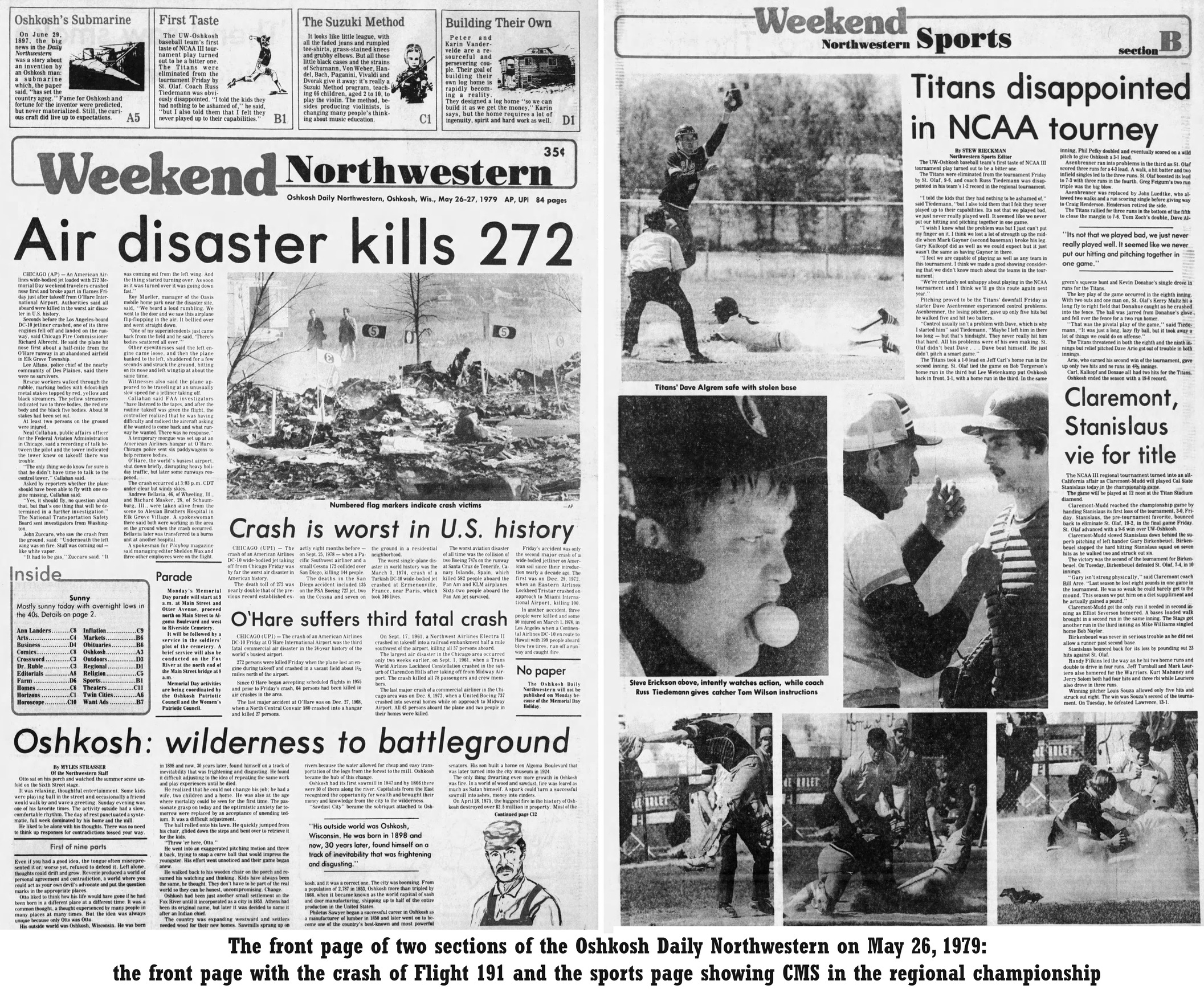 Saturday, May 26
Saturday, May 26
Cal State Stanislaus 22, CMS 0 (Regional Finals)
Fiction and reality are two very different things, and CMS would have certainly won the regional championship if someone was penning the story from their imagination. The Stags were certainly shaken up by how close they came to being on that fateful flight, and once the initial shock wore off, the chance to play again might have been the sort of inspiration that brings out the best in everyone and produces a convenient happy ending before the epilogue or closing credits.
Reality was, though, that the Stags had burned through most of their pitching in those first four close games with high-pressure innings that taxed their arms, where every fast ball required maximum effort and every breaking ball required maximum break.
CMS tried to manufacture an "all-staff" game, but the powerful Stanislaus team that had just been shut out by the Stags the day before was locked in, and had a rested starting pitcher. The Warriors scored four times in the first inning, twice more in the third, and ended up handing CMS a 22-0 defeat (12 of those runs did come in the last three innings, as the Stags sputtered on an empty tank).
"In the end we just ran out of pitching," said Wolf, who came out of the bullpen on just one day's rest after a high-pressure start, as did Katlin. "Everyone pitched and everyone was gassed. I remember pitching in that game with nothing in my arm. It was basically batting practice."
With no unlucky bounce to lament, or near-miss to drive them crazy, the Stags at least could leave the field thinking about the season and the tournament run as a whole, with their heads held high. They might not all have the same memories about the events of that week, but the pride in what they accomplished on the field is universal.
"What struck me most in that tournament was the resilience the team showed, as attrition started setting in," said Dunstan. "Jon Stott blew out his knee, I popped my right shoulder out of the socket. We had a couple other guys go down as well, and by the time we got to the championship game, we had no arms and basically no outfield left. But as each guy went down, somebody else stepped up. We had incredible confidence in each other."
"I'm not certain how well I remember the end of the season," said Wolf, "but I do remember being one of the captains of that team and was, and still am, very proud of how we played and how far we were able to go. If I am not mistaken, I think we ended up ranked No. 3 in NCAA Division III. It was a great way to end my CMC baseball career, but it would have been much better had we made it to the World Series. We were one win away, but it was not a bad way to finish, and gave Arce a pretty good ending to his coaching career."
"It was a special time for the CMS Baseball program," said Birkenbeuel. "We were a gutty team that got the most out of our talent with good defense, timely hitting, and excellent fundamentals. We'd bunt a runner over, steal a base, whatever you had to do to win a game. Coach Arce always preached that nobody was better than us, so we should always believe that we could win, and also that we weren't better than anyone else, so we should always maintain our humility. We took that to heart and played that way."
"We had a team of hard-working winners who made the absolute most out of their sometimes limited God-given talents," said Severson. "Arce was a great coach, a better man, and truly believed in young people, and I believe enjoyed bringing out the best in each of them."
"Coach Arce was the key," agreed Stott. "He could deal with prima donna players and dumb freshmen like me. Having a coach with a doctorate meant he got the best out of almost everyone."
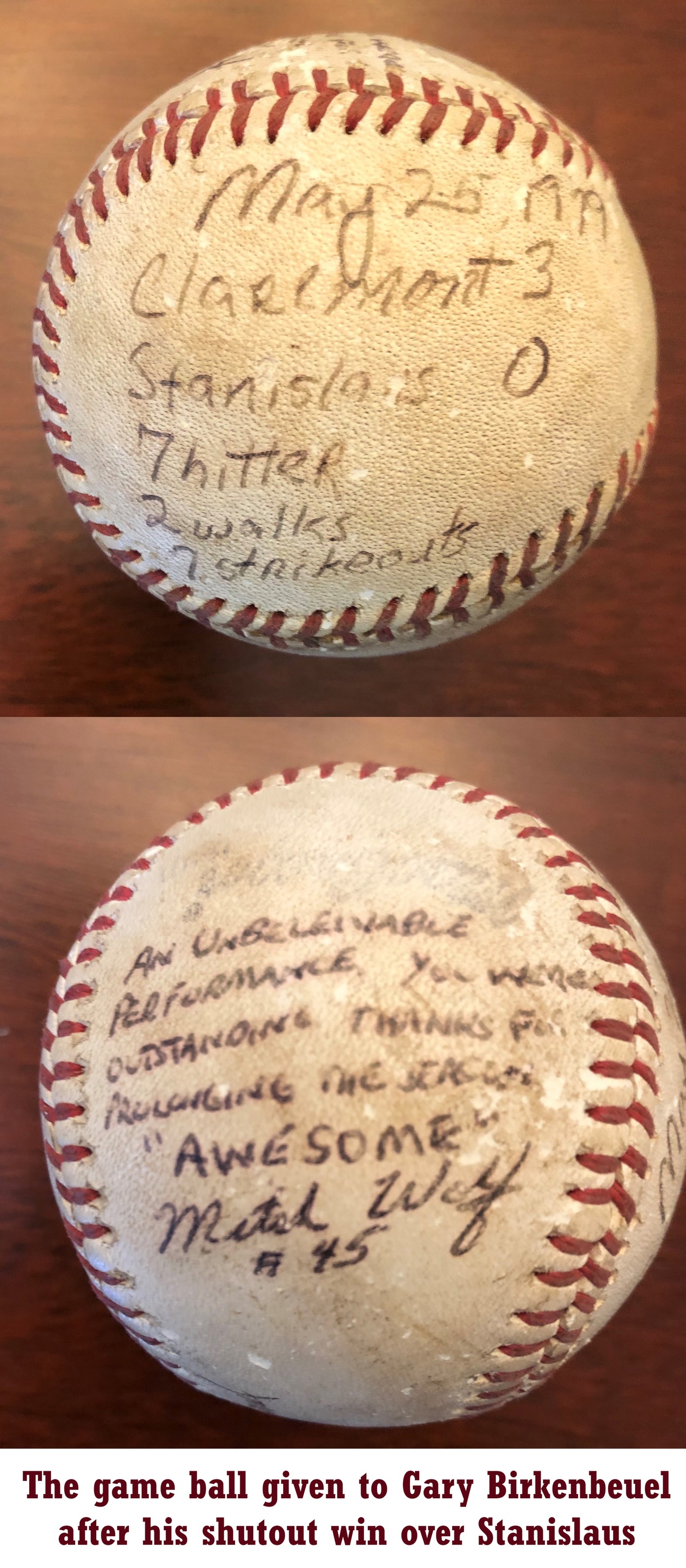 The crash of Flight 191 didn't affect Claremont McKenna or the Claremont Colleges directly, although there were certainly some personal and professional connections. Within the SCIAC, Caltech director of development Richard Schuster and professor of chemical engineering Robert Vaughan were two of the victims.
The crash of Flight 191 didn't affect Claremont McKenna or the Claremont Colleges directly, although there were certainly some personal and professional connections. Within the SCIAC, Caltech director of development Richard Schuster and professor of chemical engineering Robert Vaughan were two of the victims.
Regardless, May 25, 1979, became a tragically sad day for many people across Southern California, the home of the majority of the passengers and flight crew. The date is now displayed on a plaque at the Flight 191 Memorial in Des Plaines, Illinois, just north of O'Hare Airport, along with a wall featuring the names of all 273 victims on individual bricks.
For the CMS baseball program, it is also a significant date, but for purely baseball reasons. It's the day of Bill Arce's final coaching win, a 3-0 upset over Cal State Stanislaus which gave the Stags their deepest-ever NCAA Tournament run in Oshkosh, Wisconsin, roughly 120 miles away from Chicago and O'Hare Airport.
There may not be a trophy around the athletic department to commemorate that win or that tournament, but the memories of what happened that week, and what didn't happen, have stayed with the Stags anyway. They were one more win from hanging an NCAA Division III Regional Championship banner on campus, and perhaps, even though you couldn't blame them if they didn't let their minds drift in those directions very often, one loss from a memorial on campus. It's a hard week to forget.
The non-fiction story of the 1979 CMS baseball team is somewhere in between those two outcomes, a great team that had a great postseason run and came up one win short of history. While the Stags would all love to have earned that one extra win, and perhaps even a couple more at the World Series if they extended their wish list, they would all agree that their story has a pretty happy ending just the way it is, and they definitely don't need a trophy to help them remember it.
In fact, there are some things better than trophies.
"I have the game ball from the Stanislaus game that the team signed for me," said Birkenbeuel. "I still have it in my house all these years later."
The handwritten date on the ball remains clearly visible: May 25, 1979.
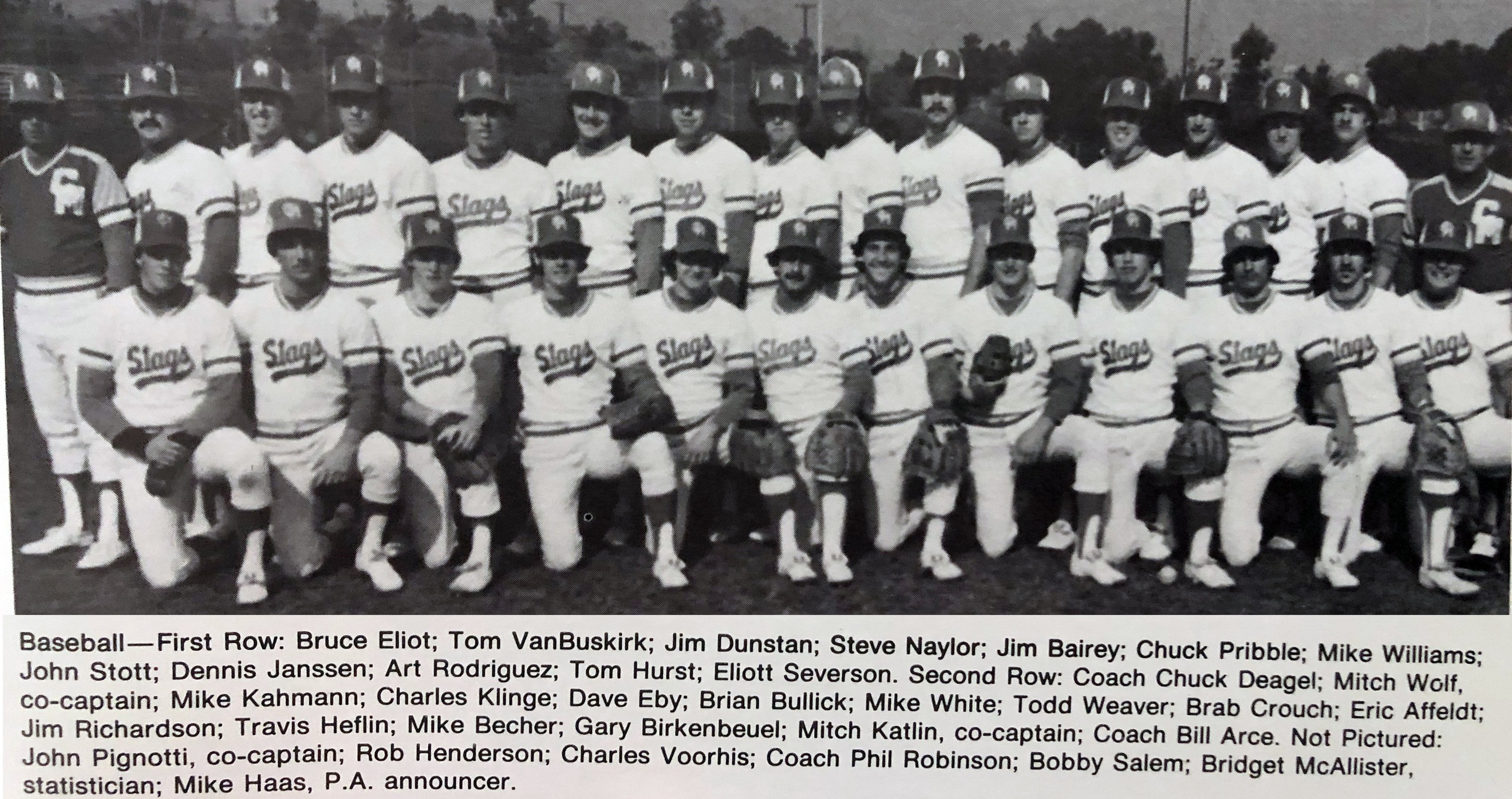 1979 CMS Baseball Roster
1979 CMS Baseball Roster
Head Coach: Bill Arce
Assistant Coaches: Chuck Deagle, Phil Robinson
Statistician: Bridget McCallister
Eric Affeldt, 1B
Jim Bairey, OF
Mike Becher, 1B
Gary Birkenbeuel, P
Brian Bullock, C
Brabston Crouch, P
Jim Dunstan, OF
Dave Eby, C
Bruce Eliot, OF
Travis Heflin, OF
Tom Hurst, 3B
Dennis Janssen, DH
Mike Kahmann, P
Mitch Katlin, P
Charles Klinge, C
Steve Naylor, 3B
John Pignotti, C
Chuck Pribble, 2B
Jim Richardson, SS
Art Rodriguez, P
Elliott Severson, OF
Jon Stott, OF
Tom Van Buskirk, P
Todd Weaver, P
Mike White, 1B
Mike Williams, SS
Mitch Wolf, P